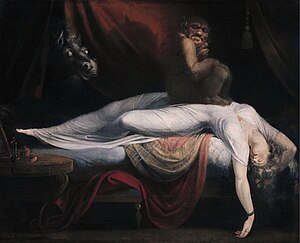മാരെ (നാടോടിക്കഥ)
ഈ ലേഖനത്തിന്റെ ശൈലി-ഘടന പ്രശ്നങ്ങൾ ശരിയാക്കാൻ തിരുത്തലുകൾ വേണ്ടിവന്നേയ്ക്കും. (2023 ജൂൺ) |
ജർമ്മനിക്, സ്ലാവിക് നാടോടിക്കഥകളിലെ ഒരു വിദ്വേഷഭാവമുള്ള അസ്തിത്വമാണ് മാരെ. ആളുകൾ അഗാധ നിദ്രയിലായിരിക്കുമ്പോൾ മാരെ അവരുടെ നെഞ്ചിൽ കയറിയിരുന്ന് അവരിലേയ്ക്ക് പേടിസ്വപ്നങ്ങൾ കൊണ്ടുവരുന്നുവെന്ന് വിശ്വസിക്കപ്പെടുന്നു.[1]

പദോൽപ്പത്തി
തിരുത്തുകMare എന്ന വാക്കിൻറെ ഉത്ഭവം (Mere, mere, mær എന്നിവയുൾപ്പെടെ അനേകം രൂപഭേദങ്ങളുള്ള) പഴയ ഇംഗ്ലീഷ് സ്ത്രീലിംഗ നാമമായ mære-ൽ നിന്നാണ് (Mere, mere, mær) ഉത്ഭവിച്ചത്.[2] ഇവ പ്രോട്ടോ-ജർമ്മനിക് *മറോണിൽ നിന്നായിരിക്കാം വരുന്നത്. *മറോൻ പഴയ നോർസിന്റെ ഉറവിടമാണ്. മാറ, അതിൽ നിന്നാണ് സ്വീഡിഷ്: മാറ; ഐസ്ലാൻഡിക്: മാറ; ഫറോസ്: മാര; ഡാനിഷ്: മാരേ; നോർവീജിയൻ: mare/mara, Dutch: (nacht)merrie, and German: (Nacht)mahr. ഫ്രഞ്ച് കോഷെമറിലെ -മാർ ('പേടിസ്വപ്നം') ജർമ്മനിയിൽ നിന്ന് പഴയ ഫ്രഞ്ച് പദമായ മാരിലൂടെ കടമെടുത്തതാണിത്.[1]
ഭൂരിഭാഗം പണ്ഡിതന്മാരും ഈ വാക്ക് പുനർനിർമ്മിച്ച പ്രോട്ടോ-ഇന്തോ-യൂറോപ്യൻ റൂട്ട് *മെർ-, തകർക്കൽ, അമർത്തൽ, അടിച്ചമർത്തൽ എന്നിവയുമായി ബന്ധപ്പെട്ടിരിക്കുന്നു.[3][4][5] അല്ലെങ്കിൽ മറ്റ് സ്രോതസ്സുകൾ അനുസരിച്ച് 'ഉരച്ച് കളയുക' അല്ലെങ്കിൽ 'ദ്രോഹിക്കുക'.[6] എന്നിരുന്നാലും, മറ്റ് പദപ്രയോഗങ്ങൾ നിർദ്ദേശിക്കപ്പെട്ടിട്ടുണ്ട്. ഉദാഹരണത്തിന്, Éva Pócs ഈ പദത്തെ ഗ്രീക്ക് μόρος (ഇന്തോ-യൂറോപ്യൻ *മോറോസ്) എന്ന പദവുമായി ബന്ധപ്പെടുത്തിയതായി കണ്ടു. അതായത് 'നാശം'.[7][8][9]ഈ വാക്കിന്റെ ഉത്ഭവ സമയത്തെക്കുറിച്ച് ചരിത്രകാരന്മാർക്കിടയിൽ കൃത്യമായ ഉത്തരമില്ല. ഭാഷാശാസ്ത്രജ്ഞനായ യെലേയാസർ മെലെറ്റിൻസ്കി പറയുന്നതനുസരിച്ച്, പ്രോട്ടോ-സ്ലാവോണിക് റൂട്ട് മാരാ ജർമ്മനിക് ഭാഷയിലേക്ക് കടന്നുവന്നത് ബിസി ഒന്നാം നൂറ്റാണ്ടിലാണ്.[10]
നോർവീജിയൻ, ഡാനിഷ് ഭാഷകളിൽ, 'പേടിസ്വപ്നം' എന്നതിന്റെ തത്യുല്യമായ വാക്കുകൾ യഥാക്രമം മാരേരിറ്റ്, മാരേരിഡ്റ്റ് എന്നിവയാണ് എന്നതിനാൽ അവയെ നേരിട്ട് 'മാരേ-റൈഡ്' എന്ന് വിവർത്തനം ചെയ്യാവുന്നതാണ്. ഐസ്ലാൻഡിക് പദമായ martröð എന്നതിന് ഒരേ അർത്ഥമുണ്ട് (-ട്രോയ, 'ട്രാമ്പിൾ', 'സ്റ്റാമ്പ് ഓൺ' എന്ന ക്രിയയിൽ നിന്ന്, ട്രെഡുമായി ബന്ധപ്പെട്ടതാണ്), അതേസമയം സ്വീഡിഷ് ഭാഷയിൽ മാർഡ്രോം 'മാരേ-സ്വപ്നം' എന്നാണ് വിവർത്തനം ചെയ്യുന്നത്.
കുറിപ്പുകൾ
തിരുത്തുക- ↑ 1.0 1.1 Bjorvand and Lindeman (2007), pp. 719–720.
- ↑ Alaric Hall, 'The Evidence for Maran, the Anglo-Saxon "Nightmares"', Neophilologus, 91 (2007), 299–317, doi:10.1007/s11061-005-4256-8.
- ↑ Julius Pokorny, Indogermanisches etymologisches Wörterbuch. 2 vols. Bern: Francke, 1959. s.v. 5. mer-.
- ↑ Jan de Vries. Altnordisches etymologisches Wörterbuch. Leiden: Brill, 1961. s.vv. mara, mǫrn.
- ↑ C. Lecouteux, 'Mara–Ephialtes–Incubus: Le couchemar chez les peuples germaniques.' Études germaniques 42: 1–24 (pp. 4–5).
- ↑ "mer- Archived 2005-09-10 at the Wayback Machine." in Pickett et al. (2000). Retrieved on 2008-11-22.
- ↑ Pócs 1999, p. 32
- ↑ Devereux (2001), Haunted Land, p.78
- ↑ μόρος. Liddell, Henry George; Scott, Robert; A Greek–English Lexicon at the Perseus Project.
- ↑ Yeleazar Meletinsky, ed. (1990). Mythological dictionary (in റഷ്യൻ). Stuttgart: Moscow: Soviet encyclopedia. ISBN 5-85270-032-0.
General references
തിരുത്തുക- Bjordvand, Harald and Lindeman, Fredrik Otto (2007). Våre arveord. Novus. ISBN 978-82-7099-467-0.
- Devereux, Paul (2001). Haunted Land: Investigations into Ancient Mysteries and Modern Day Phenomena, Piatkus Publishers.[unreliable source?]
- Grimm, Jacob (1883), "XVII. Wights and Elves", Teutonic Mythology, vol. 2, James Steven Stallybrass (tr.), W. Swan Sonnenschein & Allen, pp. 439–517
- Hødnebø, Finn and Magerøy, Hallvard (eds.) (1979). Snorres kongesagaer 1, 2nd ed. Gyldendal Norsk Forlag. ISBN 82-05-22184-7.
- Kuhn, Adalbert (1859). Sagen, Gebräuche und Märchen aus Westfalen und einigen andern, besonders den angrenzenden Gegenden Norddeutschlands. Brockhaus. pp. 18–22, 191.
- Pickett, Joseph P. et al. (eds.) (2000). The American Heritage Dictionary of the English Language, 4th ed. Boston: Houghton Mifflin. ISBN 0-395-82517-2.
- Pócs, Éva (1999). Between the living and the dead: a perspective on witches and seers in the early modern age. Central European University Press. ISBN 978-9639116184.
Further reading
തിരുത്തുക- Barešin, Sandra. "Mora kao nadnaravno biće tradicijske kulture" [Mare as Supernatural Being of Traditional Culture]. In: Ethnologica Dalmatica br. 20 (2013): 39-68. https://hrcak.srce.hr/107477
- Batten, Caroline R. “Dark Riders: Disease, Sexual Violence, and Gender Performance in the Old English Mære and Old Norse Mara.” In: The Journal of English and Germanic Philology 120, no. 3 (2021): 352–80. https://www.jstor.org/stable/10.5406/jenglgermphil.120.3.0352.